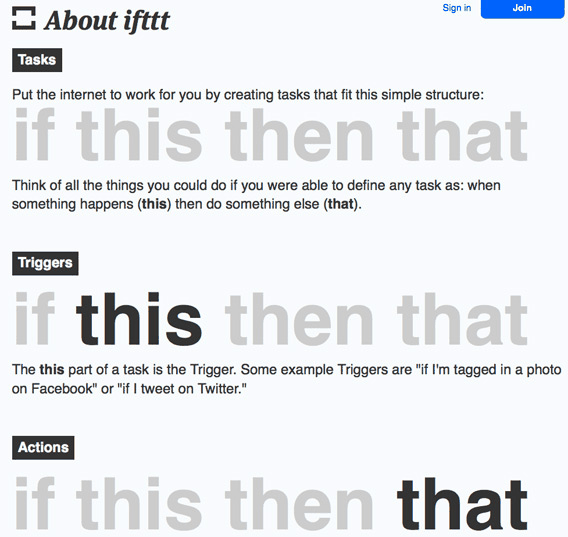I have recently become enamored with a cool little online tool that does nothing more than link up and sync all of my social-media accounts. The Web-based service, which made its official debut last month, is called Ifttt—pronounced, satisfyingly, just as it looks. And it wants to “put the Internet to work for you”—a wonderful goal, if one that says something about the technological saturation of modern life.
Ifttt is a semiacronym for “if this, then that,” and that pretty well captures how it works. You give the service a two-part command. If I’m tagged in a Facebook photo, then add it to my Dropbox account. If I tweet, then send it to my Google+ stream. If it’s going to rain in D.C. tomorrow, then send me an email. That’s it. It currently works with a few dozen popular services, including Facebook, Google and Gmail, Twitter, and Craigslist. It also links with any site using RSS or Atom feeds, giving access to the world’s blogs and news organizations, and can reach you by email and phone.
The combinations are endless. Want a phone call if it’s more than 80 degrees in Doha? Ifttt can do that for you. It can put every David Brooks column or Michael Lewis story directly into your Instapaper account. It can also put your Foursquare check-ins on your Google Calendar, if you want to keep track of where you were or who you met with. You can hand-make new options depending on what services you use. And you can borrow other people’s best Ifttt ideas in the recipes section of the site.
Even if you don’t live chained to a computer or a smartphone screen, Ifttt can still do some cool stuff to make your life easier. Say you were on the hunt for a reproduction egg chair to round out your office, and you wanted to get a sense of prices on Craigslist. Ifttt could deliver all the relevant results for a month to your email or Evernote account, so that you did not have to wade through search results every day. One of Ifttt’s creators also suggests a specific use for director-of-technology types. If you get a “server alert” message delivered to your email, Ifttt will call you, making doubly sure you know your site is down.
Of course, the more of a social-media junkie you are in the first place, the more useful the service will be—Ifttt is already a cult hit among the life-hack set. For instance, I am currently juggling Google+, Twitter, Facebook, and LinkedIn accounts. Twitter is the only service I use consistently, every day, but I wouldn’t mind having Ifttt update the others so I can better connect with my readers and sources, and maybe even see if I should shift attention to another platform.
The service has bigger ambitions than just to be a humble widget for big social media, though. In a post introducing the then by-invite-only product, its creators noted how hard it is to bend or adapt programs and sites and apps. You could buy a car and remake it as a bathtub if you felt like it. But for the most part, if you want to use Facebook, you can only use it how Mark Zuckerberg and the app makers think you should use it. “In the more abstract digital world … even the simplest of insights [requires] years of engineering experience to successfully implement,” they write. “[O]ver the past 20 years the layman’s technical vernacular has expanded blindingly fast. At the same time, we’ve been breaking down the core unit of definable functionality into ever smaller and more digestible pieces, from monolithic operating systems, to web based applications and mobile apps.”
That seems right to me. We are assaulted with a fire hose of digital information. That digital information tends to come in many disconnected streams. (It’s not for nothing that computer users flick between screens every 97 seconds, on average.) It has gotten easier to pull out the information we want—looking just at Facebook photos, or searching for certain hash-tagged tweets, for instance. But it is often terribly hard to get the services to interact with one another.
Over the years, many companies have attempted to address just that issue. Google, for instance, is trying to become a one-stop shop, adding things like daily deals and a social network so you never need to leave its yard to play elsewhere. Facebook is doing the same, adding in a messenger and shopping functions. Others have taken Ifttt’s tack, trying to knit different services together. Take the cool, if somewhat obscure, Yahoo! Pipes, which lets you “aggregate and manipulate” content from different sites. (This, for example, shows you the trailers for the top 10 movies, as judged by Rotten Tomatoes, on YouTube.)
I am not sure that Ifttt succeeds in the Herculean task of corralling all that digital information, nor that it is really trying to. (I, for one, admit to enjoying time spent idly wandering around in my various social-media accounts.) But it does succeed in making useful little tools. Nifttty, you might say.
